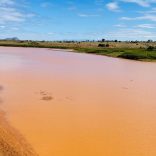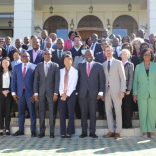Mozambique: Mining companies suspended for environmental crimes - AIM report
Assembly alters extractive industry taxation rules

The Mozambican parliament, the Assembly of the Republic, on Thursday passed unanimously two government bill changing the tax regime for mining and petroleum activities.
Introducing the bills, Finance Minister Adriano Maleiane said they are intended to improve the business environment and attract further investment.
The mining bill doubles the mining production tax levied on the extraction of sand and stones from 1.5 to three per cent – the same rate as charged on base metals and coal. Taxing quarries and sandpits at the same rate as most mines, said Maleiane, would improve the amount of money that local communities obtain from this tax, “and reduce the damaging effects of mining activity on the environment”.
In both bills, the provision in the 2014 legislation on taxes in the extractive industry which reduces taxes by 50 per cent when the end product is intended for use in Mozambican industry has been eliminated.
The original idea had been to stimulate the use of Mozambican mining products to develop local industries, Maleiane said – but in reality companies simply lied about where they were selling their products.
Or, in the diplomatic language used by the Minister, “practice has shown that the declared destination does not always coincide with the real destination of the products. For this reason, and to improve transparency in collection of this tax, it is proposed to eliminate this norm”.
The surface tax charged on companies extracting mineral water will no longer be charged by hectare but by mining title. It remains a very low tax, charged at the rate of 85,000 meticais (about 1,390 US dollars) a year, but per mining title and not per hectare. This will reduce the taxes paid by mineral water companies.
For holders of mining certificates, the surface tax is cut dramatically, from 17,500 meticais to just 30 meticais per hectare from the first to fifth years of operation and from 25,000 to 50 meticais per hectare from the sixth year onward. This is a 99.8 per cent cut in this tax.
The old rate of surface tax discouraged operators from using their mining certificates, and the government believes that the huge reduction in the tax will encourage legitimate small scale mining.
The bill also guarantees “fiscal stability” to extractive companies – but only to those with a minimum investment of five million dollars, in the case of mining, and of 100 million dollars, in the case of oil and gas. This is very different from the 2014 legislation which granted fiscal stability for a ten year period to any extractive company, regardless of the size of its investment.
Fiscal stability means that during the ten year period, the tax regime for the beneficiary will not change.
The net effect of these changes is very small. The government forecasts that the changes in mining taxation will net the treasury an extra 99,774 meticais (1,636 US dollars) a year, and the annual gain from the alterations in oil and gas taxation will be 1.13 million meticais.
But Maleiane thought the changes would be worth making, since they would help attract more investment.
Much more significant, however, is an amendment proposed by the Assembly’s Constitutional and Legal Affairs Commission, which would greatly increase the amount of money Mozambique would receive from capital gains tax charged on transactions in the extractive sector.
The capital gains tax rate is, in theory, 32 per cent. In practice, it is much less because companies have been able to treat their sales of shares as if they were selling assets on a stock exchange.
The amendment gives capital gains tax “autonomy” – that is, it is not dependent on any other taxes or gains, and will be paid at exactly the same rate regardless of whether the transaction takes place inside or outside of Mozambique. Furthermore, the costs of paying capital gains tax cannot be deducted against a company’s other tax liabilities (corporation tax, for example).
If this had been in force when the Italian energy company ENI sold half its stake in the Rovuma Basin Offshore Area Four to the American oil and gas giant ExxonMobil for 2.8 billion dollars, ENI would have had to pay the full 32 per cent capital gains tax, and not the currently agreed figure of less than half that amount.












Leave a Reply
Be the First to Comment!
You must be logged in to post a comment.
You must be logged in to post a comment.